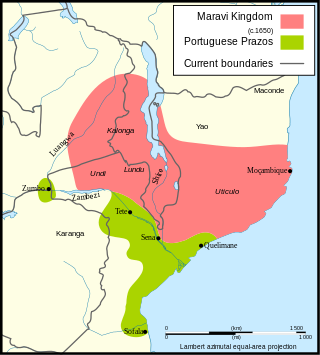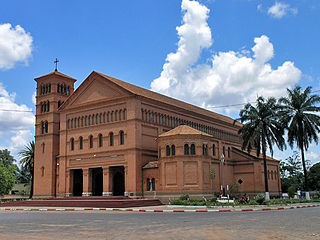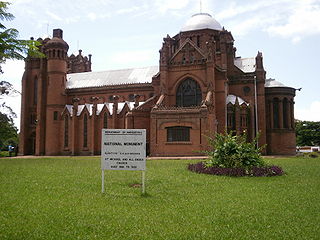The History of Malawi covers the area of present-day Malawi. The region was once part of the Maravi Empire. In colonial times, the territory was ruled by the British, under whose control it was known first as British Central Africa and later Nyasaland. It became part of the Federation of Rhodesia and Nyasaland. The country achieved full independence, as Malawi, in 1964. After independence, Malawi was ruled as a one-party state under Hastings Banda until 1994.

Presbyterianism is a part of the Reformed tradition within Protestantism that broke from the Roman Catholic Church. Presbyterian churches derive their name from the presbyterian form of church government by representative assemblies of elders. Many Reformed churches are organised this way, but the word Presbyterian, when capitalized, is often applied to churches that trace their roots to the Church of Scotland or to English Dissenter groups that formed during the English Civil War.

Lilongwe is the capital and most populated city of the African country of Malawi. It has a population of 989,318 as of the 2018 Census, up from a population of 674,448 in 2008. In 2020 that figure was 1,122,000. The city is located in the central region of Malawi, in the district of the same name, near the borders with Mozambique and Zambia, and it is an important economic and transportation hub for central Malawi. It is named after the Lilongwe River.

Maravi was a kingdom which straddled the current borders of Malawi, Mozambique, and Zambia, in the 16th century. The present-day name "Maláŵi" is said to derive from the Chewa word malaŵí, which means "flames". "Maravi" is a general name of the peoples of Malawi, eastern Zambia, and northeastern Mozambique. The Chewa language, which is also referred to as Nyanja, Chinyanja or Chichewa, and is spoken in southern and central Malawi, in Zambia and to some extent in Mozambique, is the main language that emerged from this empire.

Christianity in Africa first arrived in Egypt in approximately 50 AD. By the end of the 2nd century it had reached the region around Carthage. In the 4th century, the Aksumite empire in modern-day Ethiopia and Eritrea became one of the first regions in the world to adopt Christianity as its official religion. The Nubian kingdoms of Nobatia, Makuria and Alodia followed two centuries later. From the late fifth and early sixth century, the region included several Christian Berber kingdoms. Important Africans who influenced the early development of Christianity and shaped the doctrines of Christianity include Tertullian, Perpetua, Felicity, Clement of Alexandria, Origen of Alexandria, Cyprian, Athanasius and Augustine of Hippo.
Christianity has been very much at the heart of religion in Zambia since the European colonial explorations into the interior of Africa in the mid 19th century. The area features heavily in the accounts of David Livingstone's journeys in Central Africa.
Christianity in Angola has existed since 1491. Today 80% of Angolans practise some form of Christianity.

Christianity is the predominant religion in Zambia and is recognised as the state religion by the country's constitution. Before the arrival of European missionaries, the various ethnic groups residing in the territory of modern day Zambia practiced a variety of African traditional religions.

Robert Laws FRGS FRSGS (1851–1934) was a Scottish missionary who headed the Livingstonia mission in the Nyasaland Protectorate for more than 50 years. The mission played a crucial role in educating Africans during the colonial era. It emphasized skills with which the pupils could become self-sufficient in trade, agriculture or industry as opposed to working as subordinates to European settlers. Laws supported the aspirations of political leaders such as Simon Muhango and Levi Zililo Mumba, both educated at Livingstonia schools.

Religion in Angola is diverse, with Christianity being the most widely professed faith. Roman Catholics constitute about half of the population. Other Christian denominations include Baptists, Methodists, Congregationalists, Lutherans, Reformed Churches and Seventh-day Adventists and Jehovah's Witnesses - all these denominations making up about a quarter of the population.

Christianity is the predominant religion in the Democratic Republic of the Congo, with Catholicism and Protestantism being its main denominations.

Christianity is the most widely professed religion in Zimbabwe, with Protestantism being its largest denomination.
Characteristic of Christianity in the 19th century were evangelical revivals in some largely Protestant countries and later the effects of modern biblical scholarship on the churches. Liberal or modernist theology was one consequence of this. In Europe, the Roman Catholic Church strongly opposed liberalism and culture wars launched in Germany, Italy, Belgium and France. It strongly emphasized personal piety. In Europe there was a general move away from religious observance and belief in Christian teachings and a move towards secularism. In Protestantism, pietistic revivals were common.

Protestantism in Portugal has long been a minority religion. After the Reformation, the Inquisition and the Portuguese government's religious intolerance outlawed the practice of non-Roman Catholic faiths in the country, and those who followed them could not practice it openly.

Christianity is the majority religion of the Democratic Republic of the Congo and is professed by a majority of the population.

The Church of Central Africa Presbyterian (CCAP) is a Presbyterian denomination. It consists of five synods: one in Zambia, one in Zimbabwe and three in Malawi – Livingstonia Synod in the north of the country, Nkhoma Synod in the centre, and Blantyre Synod in the south.

Christianity is the religion with the largest following in Ghana. Christian denominations include Catholics, Methodists, Anglicans, Presbyterians, Lutherans, Seventh-Day Adventists, Pentecostals, Baptists, Evangelical Charismatics, Latter-day Saints, etc.

Christianity is the largest religion practiced in Zimbabwe, accounted for more than 84% of the population. The arrival of Christianity dates back to the 16th century by Portuguese missionaries such as Fr. Gonsalo Da Silveira of the Roman Catholic Church. Christianity is embraced by the majority of the population. It is estimated 85 percent of Zimbabweans claim to be Christians, with approximately 62 percent regularly attending church services. Christian faith plays a very important role in the organization of Zimbabwean society.
The Blackman's Church of Africa Presbyterian is an independent Presbyterian denomination in Malawi. Each of its three founding pastors had been educated at the Livingstonia, Malawi mission and ordained as ministers of the Scottish missionary-led Presbyterian church based there. Although the Livingstonia mission was transferred to its present site in 1878, the missionaries were very cautious about ordaining African ministers. A theological course was established there in 1896 to train African ministers and the first two students completed it by 1900, but the first ordinations were not carried out until 1914. Of the students involved in the course between 1900 and 1914, only around half were ever ordained, on average, about ten years after completing the course, the other half were suspended, resigned or died. Donald Fraser, one of the leading Scottish missionaries, considered that the theological education of African candidates for ordination was insufficient without an "established christian character", which could only be proven through a lengthy probation. Although all three of the founders were ordained, all fell foul of the church establishment and left to form independent churches.















